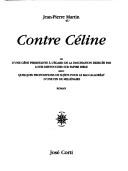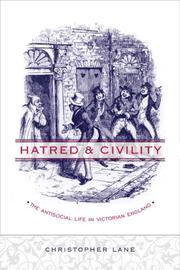| Listing 1 - 8 of 8 |
Sort by
|

ISBN: 271430608X Year: 1997 Publisher: Paris : Corti,
Abstract | Keywords | Export | Availability | Bookmark
 Loading...
Loading...Choose an application
- Reference Manager
- EndNote
- RefWorks (Direct export to RefWorks)
Book
ISBN: 9783662663219 Year: 2022 Publisher: Berlin, Heidelberg : J. B. Metzler'sche Verlagsbuchhandlung & Carl Ernst Poeschel GmbH,
Abstract | Keywords | Export | Availability | Bookmark
 Loading...
Loading...Choose an application
- Reference Manager
- EndNote
- RefWorks (Direct export to RefWorks)
Patrick Siegmann's study explores the concept of hate in literature through the works of authors such as Elfriede Jelinek, Thomas Bernhard, and Rainald Goetz. It examines how a poetics of hate critiques categories like homeland and family while addressing Germany's historical and cultural identity. The work integrates philosophical, sociological, and psychological theories to analyze the role of hate as a societal force and its depiction in cultural studies. By distinguishing between real and literary hate speech, the study offers insights into hate as a medium for both historical reflection and literary criticism. Intended for academics and scholars interested in cultural studies and literary analysis, the book presents hate as a complex literary device with potential for social critique.
Book
ISBN: 2738159125 Year: 2016 Publisher: Odile Jacob
Abstract | Keywords | Export | Availability | Bookmark
 Loading...
Loading...Choose an application
- Reference Manager
- EndNote
- RefWorks (Direct export to RefWorks)
"La violence n'a pas subitement surgi dans nos vies avec les attentats de janvier et de novembre 2015. Aucune de nos relations, qu'elles soient familiales, scolaires, professionnelles, morales ou politiques, n'y échappe. Mais la terreur instaurée par les attaques terroristes est une épreuve sans précédent. D'abord parce qu'elle provoque la hantise de la répétition : nous savons qu'à la terrasse d'un café, dans une salle de spectacle ou dans les transports en commun, la violence peut à nouveau frapper. La peur, le désir de vengeance et de justice accompagnent notre volonté d'en finir avec ce que nous considérons comme le mal radical. Comment pourrait-il en aller autrement ? Et qui nous le reprocherait ? Mais le risque est alors d'autoriser les emportements, les jugements précipités, les décisions aveugles et, finalement, de répondre à la violence par la violence. Faire face à la haine est un défi pour nos sociétés. Dans ce livre courageux, à contre-courant de bien des discours actuels, et convoquant toutes les ressources de la philosophie, Marc Crépon défend le principe du refus de la violence, du refus de consentir à son oeuvre et à la culture de destruction qui l'accompagne. Les grandes figures de la non-violence que furent Jaurès, Romain Rolland, Martin Luther King et Mandela nous offrent des modèles et prouvent que la terreur n'est ni invincible ni fatale."--Page 4 of cover.
Hate --- Violence --- Nonviolence --- Violence in literature. --- Hate in literature. --- Prevention. --- Philosophy. --- Political aspects.
Book
ISBN: 8474881080 Year: 1984 Publisher: Bellaterra Universidad autonoma de Barcelona
Abstract | Keywords | Export | Availability | Bookmark
 Loading...
Loading...Choose an application
- Reference Manager
- EndNote
- RefWorks (Direct export to RefWorks)
Literature, Medieval --- -Women --- -Women in literature --- History and criticism --- History --- Apathy in literature --- Feudalism in literature --- Hate in literature --- Women in literature --- History -

ISBN: 0231503903 0231130643 0231130651 Year: 2004 Publisher: Columbia University Press
Abstract | Keywords | Export | Availability | Bookmark
 Loading...
Loading...Choose an application
- Reference Manager
- EndNote
- RefWorks (Direct export to RefWorks)
To understand hatred and civility in today's world, argues Christopher Lane, we should start with Victorian fiction. Although the word "Victorian" generally brings to mind images of prudish sexuality and well-heeled snobbery, it has above all become synonymous with self-sacrifice, earnest devotion, and moral rectitude. Yet this idealized version of Victorian England is surprisingly scarce in the period's literature--and its journalism, sermons, poems, and plays--where villains, hypocrites, murderers, and cheats of all types abound.
English literature --- Misanthropy in literature. --- Literature and society --- Alienation (Social psychology) in literature. --- Interpersonal relations in literature. --- Manners and customs in literature. --- Courtesy in literature. --- Hate in literature. --- History and criticism. --- History --- England --- Great Britain --- Social life and customs
Book
ISSN: 00732397 ISBN: 9782600017633 2600017631 Year: 2014 Volume: 473 Publisher: Genève Droz
Abstract | Keywords | Export | Availability | Bookmark
 Loading...
Loading...Choose an application
- Reference Manager
- EndNote
- RefWorks (Direct export to RefWorks)
Une évocation de la haine comme principe esthétique sensible dans la création littéraire. L'auteur aborde notamment la poésie de la Renaissance, les pamphlets des guerres de Religion, le tragique chez Corneille et Racine, la conscience littéraire chez Rousseau, la perversion chez Céline ou encore le roman contemporain.
Comparative literature --- Thematology --- Literature --- Hate in literature --- Littérature --- Haine dans la littérature --- Aesthetics --- Themes, motives --- Esthétique --- Thèmes, motifs --- French literature --- History and criticism --- Littérature --- Haine dans la littérature --- Esthétique --- Thèmes, motifs --- Themes, motives. --- French literature - History and criticism
Book
ISBN: 9788883170492 8883170490 Year: 2008 Publisher: Cassino : Università di Cassino,
Abstract | Keywords | Export | Availability | Bookmark
 Loading...
Loading...Choose an application
- Reference Manager
- EndNote
- RefWorks (Direct export to RefWorks)
Latin literature --- Oratory, Ancient. --- Hate --- Littérature latine --- Eloquence antique --- Haine --- Translations into Italian --- Traductions italiennes --- Quintilian --- Authorship. --- Declamationes pseudo-Quintilianeae (Maiores) --- Hate in literature --- Oratory, Ancient --- Roman literature --- Classical literature --- Classical philology --- Latin philology --- Quintilianus, Marcus Fabius. --- Quinctilian --- Quintilien --- Quintiliano, Marco Fabio --- Kvintilijan --- 昆体良 --- Quintiliano --- Quintillian --- Declamationes maiores --- Declamationes majores --- Grandes déclamations --- Major declamations --- Quintilianus, Marcus Fabius --- Marcus Fabius Quintilianus --- Quintilianus
Book
ISBN: 113885087X 1315724502 1317531140 9781315724508 1317531159 9781317531135 9781317531142 9781138850873 0367872420 Year: 2015 Publisher: Taylor & Francis
Abstract | Keywords | Export | Availability | Bookmark
 Loading...
Loading...Choose an application
- Reference Manager
- EndNote
- RefWorks (Direct export to RefWorks)
This book studies how the tirades and unrestrained villainy of Shakespeare's art explode the decorum and safety of our sanitized lives and challenge the limits of selfhood. The literary criticism of anger and hate provides a vision of the experience of Shakespeare's theater as an intensification of human experience that goes beyond traditional contexts of character, culture, and ethics. The book, alive to the judgmental character of emotions, transforms the way we see the rancorous passions and the disorderly and disobedient demands of anger and hatred.
Hate in literature. --- Anger in literature. --- Self-knowledge in literature. --- Shakespeare, William, --- Šekspir, Vil'jam --- Criticism and interpretation. --- Shakespear, William, --- Shakspeare, William, --- Šekʻspiri, Uiliam, --- Saixpēr, Gouilliam, --- Shakspere, William, --- Shikisbīr, Wilyam, --- Szekspir, Wiliam, --- Šekspyras, --- Shekspir, Vilʹi︠a︡m, --- Šekspir, Viljem, --- Tsikinya-chaka, --- Sha-shih-pi-ya, --- Shashibiya, --- Sheḳspir, Ṿilyam, --- Shaḳspir, Ṿilyam, --- Syeiksŭpʻio, --- Shekspir, V. --- Szekspir, William, --- Shakespeare, Guglielmo, --- Shake-speare, William, --- Sha-ō, --- Şekspir, --- Shekspir, Uiliam, --- Shekspir, U. --- Šekspir, Vilijam, --- Ṣēkspiyar, Viliyam, --- Shakspir, --- Shekspyr, Vyli︠e︡m, --- Şekspir, Velyam, --- Ṣēkspiyar, Villiyam, --- Shēkʻspʻiyr, Vlilliam, --- Ṣēkspiyar, --- Ṣēkspiyar Mahākavi, --- Ṣēkspiyar Mahākaviya, --- Sheḳspier, Ṿilyam, --- Shēkʻspir, --- Shakespeare, --- Śeksper, --- Шекспир, Вильям, --- Шекспир, Уильям, --- שייקספיר, וויליאם, --- שייקספיר, וו., --- שיקספיר, וויליאם --- שיקספיר, ויליאם --- שיקספיר, ויליאם, --- שכספיר, ויליאם, --- שכספיר, וילים, --- שכספיר, ו׳ --- שעפקספיר, וויליאם, --- שעקספיער, וויליאם --- שעקספיער, וויליאם, --- שעקספיער, ווילליאם --- שעקספיער, וו., --- שעקספיר --- שעקספיר, וו --- שעקספיר, וויליאם, --- שעקספיר, וויליאמ --- שעקספיר, ווילליאם --- שעקספיר, ווילליאם, --- שעקספיר, וו., --- שעקספיר, װיליאם, --- שעקספיר, װילליאם, --- שעקספיר, װ., --- שעקספער --- שעקספער, וויליאמ --- שקספיר --- שקספיר, וו --- שקספיר, וויליאם --- שקספיר, וויליאם, --- שקספיר, ווילים, --- שקספיר, וילאם --- שקספיר, ויליאם --- שקספיר, ויליאם, --- שקספיר, ויליים, --- שקספיר, וילים --- שקספיר, וילים, --- شاكسبير، وليم --- شاكسپير، وليم --- شكسبير، وليام --- شكسبير، وليم --- شكسبير، وليم، --- شكسبير، و. --- شكسپير، وليم --- شكسپير، ويليام --- شيكسبير، وليام --- شيكسبير، وليام.، --- شيكسبير، وليم --- شکسبير، وليم --- وليم شکسبير --- 沙士北亞威廉姆, --- 沙士比亞威廉姆, --- 莎士比亞威廉姆, --- 莎士比亞威廉, --- 莎士比亞, --- Shakespeare, William --- Literature --- Shakespeare --- Coriolanus --- Emotion --- Iago --- King Lear --- Michel de Montaigne --- Othello --- William Shakespeare
| Listing 1 - 8 of 8 |
Sort by
|

 Search
Search Feedback
Feedback About UniCat
About UniCat  Help
Help News
News